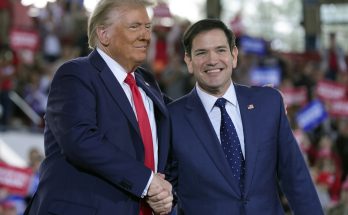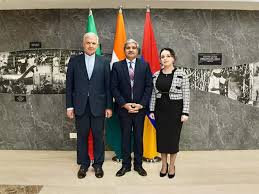 Prime Minister Narendra Modi has successfully ended his visit to Bangladesh with a rousing public oration, amidst some lingering doubts expressed by the Bangladeshi media about the Teesta water sharing agreement.
Prime Minister Narendra Modi has successfully ended his visit to Bangladesh with a rousing public oration, amidst some lingering doubts expressed by the Bangladeshi media about the Teesta water sharing agreement.
Invoking the immortal lines from poet Jibanondo Das — Aabaar aashibo phire, Eyi dhanshirir teere, Eyi Banglaye — Modi promised to return, leaving his audience to read between the lines.
The Teesta agreement remains hostage to Indian domestic politics with West Bengal chief minister Mamata Banerjee caught in a cleft stick, between seeking to leverage it for extracting more financial benefits for her state and the imperatives of the state elections in 2016.
Bangladesh was the fourth among India’s neighbours, after Bhutan, Nepal and Sri Lanka that Modi has visited.
For his swearing in ceremony, Modi invited all Saarc leaders and the Prime Minister of Mauritius in an unprecedented signal of a more robust neighbourhood policy. Modi’s 18 foreign visits so far, have included several major powers and some smaller ones. While the government’s successful conduct of foreign policy is certainly worthy of applause, on domestic front, despite strenuous efforts, the success rate is still modest.
Arguably, consensus building in domestic politics is a far more complex and arduous task. Modi did not want to visit Bangladesh with two major bilateral agreements — the Land Boundary Agreement (LBA) and the Teesta agreement — in the balance and embroiled in political and legislative crossfire. The successful piloting of the Constitution Amendment Bill through Parliament, after neutralising domestic opposition mainly from Banerjee and Assam chief minister Tarun Gogoi was, indeed, the right move.
For Bangladesh Prime Minister Sheikh Hasina the visit has been a diplomatic boost. Modi’s visit has been a foreign policy triumph for Hasina, primarily for the LBA, at a time when the opposition in Bangladesh is on the warpath.
The Islamists have also gone on the offensive against the Hasina government for her decision to institute the war crimes trials, for atrocities committed during Bangladesh’s 1971 war by the Pakistani government, its army and local collaborators. Several leaders of Islamic parties and organisations, including the Jamaat-e-Islami, have been convicted and two have been executed. This year alone four bloggers have been hacked to death on the streets of Dhaka by Muslim extremists.
The new militant Islamist outfit, ‘Ansar Bangla 8’, also known as ‘Ansar Bangla Team’ (ABT), has claimed responsibility for these killings. The Bangladesh government has banned the ABT, the sixth such group to be banned in Bangladesh.
Hasina has had a string of successes in tackling terrorists, Islamic radicals and Indian insurgent groups which had earlier operated from their safe havens in Bangladesh, conducting anti-India operations under the patronage of the earlier government led by Begum Khaleda Zia, allied with the Jamaat-e-Islami and in cahoots with the Inter Services Intelligence (ISI).
The other major area of concern for India has been illegal migration and human trafficking.
Modi’s visits to the Dhakeshwari Temple and the Ramakrishna Mission in Dhaka was also required for boosting the morale of the beleaguered Hindu community in Bangladesh whose numbers have steadily fallen from 19% in 1971 to around 9% today.
The pride of place among the 22 agreements signed during the visit was the LBA, for which the Instruments of Ratification were exchanged. MOUs on cooperation in human trafficking, fake currency and narcotics smuggling and new bus routes connecting Agartala-Dhaka-Kolkata and Guwahati-Shillong-Dhaka have been inaugurated.
Agreements were also signed on the use of Chittagong and Mongla ports by Indian ships, starting coastal shipping services, cooperation between Bangladesh and Indian universities, cooperation between the two coast guards, in addition to IT and cultural exchange agreements.
Bangladesh will establish a 600-acre special economic zone (SEZ) exclusively for Indian investors who wish to set up manufacturing units for domestic markets in both countries and for export. Private sector investment in the power sector from the Adani and Reliance groups are also in the pipeline.
For seamless connectivity, Bangladesh railways have to continue converting many existing railway tracks to dual gauge. The $2 billion, the new line of credit, announced during the visit, will help such projects.
The Inland Waterway Trade and Transit Treaty (IWTT) and the trade agreement have been renewed. Inland waterways have long provided connectivity between West Bengal ports and inland ports in Bangladesh and Assam.
Both railways and waterways provide relatively cheaper modes of transportation than roads. More border ‘haats’ have been opened to provide trading opportunities for local people but to address the trade imbalance Modi has promised to upgrade border infrastructure and reduce non-tariff barriers (NTBs).
Bangladesh’s geostrategic location in India’s eastern region requires sustained nurturing of bilateral ties, with India shouldering asymmetrical responsibilities.
Bangladesh has overcome political and economic setbacks and rebounded successfully, clocking up a GDP growth averaging around 6% annually. The debate in Parliament on the LBA was a clear indication of bipartisan consensus on forging ahead with stronger ties with Bangladesh.
There are similar trends emerging in Bangladesh, where the traditionally anti-Indian parties like the Khaleda-led Bangladesh Nationalist Party (BNP) and its principal ally, the Islamist Jamaat-e-Islami, welcomed Modi’s visit and the conclusion of the LBA. Khaleda met Modi and her party spokesperson reiterated that the BNP sought good relations with India.
The Jamaat too has made similar comments. India should maintain links with opposition position parties in Bangladesh but there should be no hesitation in providing Hasina with unstinted support. Both Hasina and Modi will be in power for the next four years and have the historic opportunity to further strengthen bilateral ties for which the Modi visit has contributed in no small measure.
The next generation of Bangladeshis and Indians expect no less.
Author Profile
- India Writes Network (www.indiawrites.org) is an emerging think tank and a media-publishing company focused on international affairs & the India Story. Centre for Global India Insights is the research arm of India Writes Network. To subscribe to India and the World, write to editor@indiawrites.org. A venture of TGII Media Private Limited, a leading media, publishing and consultancy company, IWN has carved a niche for balanced and exhaustive reporting and analysis of international affairs. Eminent personalities, politicians, diplomats, authors, strategy gurus and news-makers have contributed to India Writes Network, as also “India and the World,” a magazine focused on global affairs.
Latest entries
 India and the WorldFebruary 12, 2025India’s Strategy: Navigating ties with new regime in Dhaka
India and the WorldFebruary 12, 2025India’s Strategy: Navigating ties with new regime in Dhaka India and the WorldFebruary 11, 2025In Paris, Modi pitches for AI for All, Global South
India and the WorldFebruary 11, 2025In Paris, Modi pitches for AI for All, Global South India and the WorldFebruary 5, 2025Why India-EU partnership matters amid global crises, explains Jaishankar
India and the WorldFebruary 5, 2025Why India-EU partnership matters amid global crises, explains Jaishankar India and the WorldJanuary 21, 2025Make in India complements Made in Italy: Ambassador
India and the WorldJanuary 21, 2025Make in India complements Made in Italy: Ambassador







